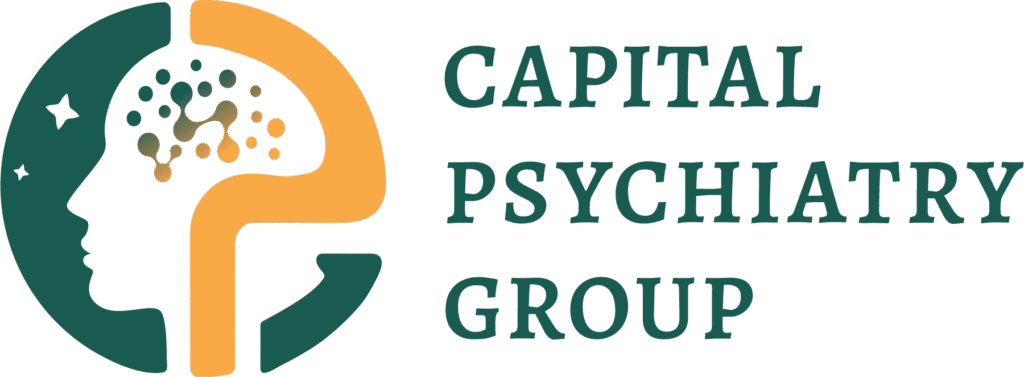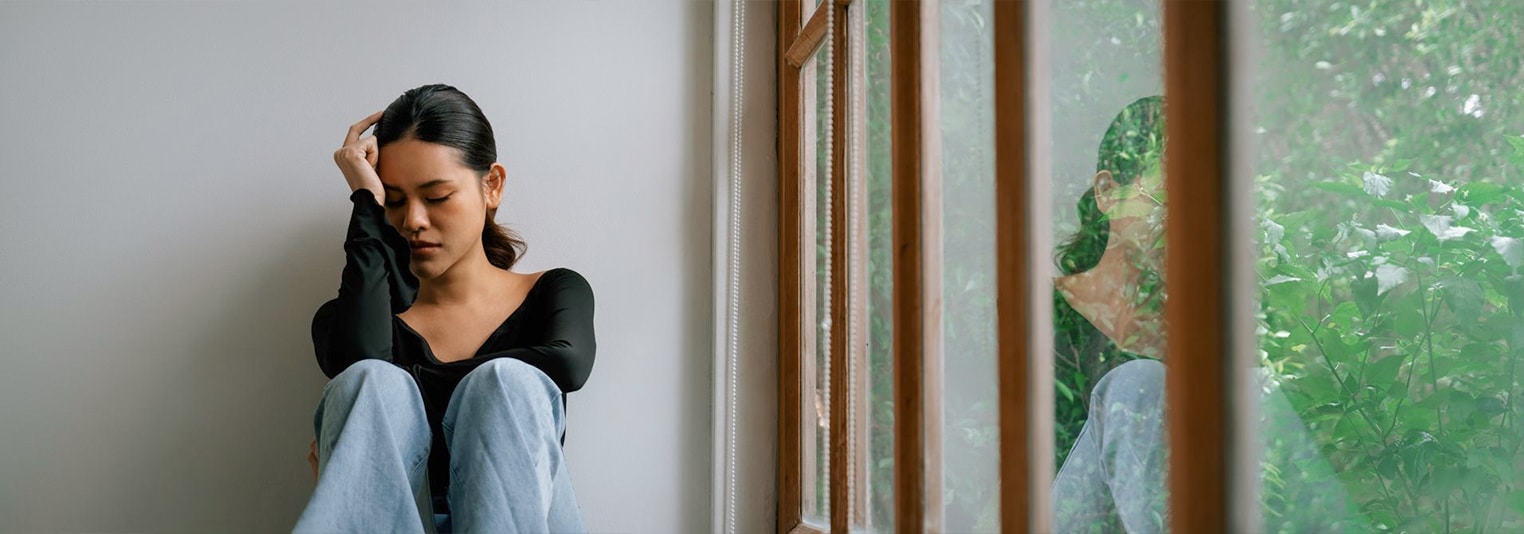

What Is Generalized Anxiety Disorder (GAD)?
- Prevalence: Anxiety disorders affect 1 in 3 adults in the U.S. (34% lifetime). For GAD specifically, about 6% of people experience it during their lifetime.
- Symptoms: Excessive, hard-to-control worry most days for 6+ months, with signs like muscle tension, fatigue, irritability, poor focus, and sleep disturbance.
- Onset: The average age of onset is around 11 years; symptoms often persist into adulthood if untreated.
Did you know?
- 1 in 5 U.S. adults (57.8 million people) lives with a mental illness each year.
- 1 in 20 adults experiences a serious mental illness that impacts daily life.
- 1 in 6 youth (ages 6–17) face a mental health disorder annually.
- 50% of all mental illnesses begin by age 14, and three-quarters by age 24.
- Suicide is the 2nd leading cause of death among people ages 10–14.
How GAD Affects Daily Life
- Thoughts: Racing or intrusive worries (“What if I fail? What if I get sick?”).
- Emotions: Fear, dread, sadness, irritability.
- Behaviors: Avoidance, procrastination, reassurance-seeking, over-checking.
- Body: Muscle tension, sweating, fast heartbeat, trouble sleeping.
- Work & school: U.S. data show GAD can cause 4+ missed workdays/month and major productivity loss.
- Relationships: Irritability and worry strain family life.
- Health: Untreated GAD raises risks for depression, high blood pressure, heart disease, and unhealthy coping, like alcohol or drug use.
How Much Does GAD Get in the Way?
- 32% experience serious disruption (work, social, or home life).
- 44.6% experience moderate disruption.
- 23.1% experience mild disruption.
Start Your Path to Relief
Why Many in NJ Delay Seeking Care
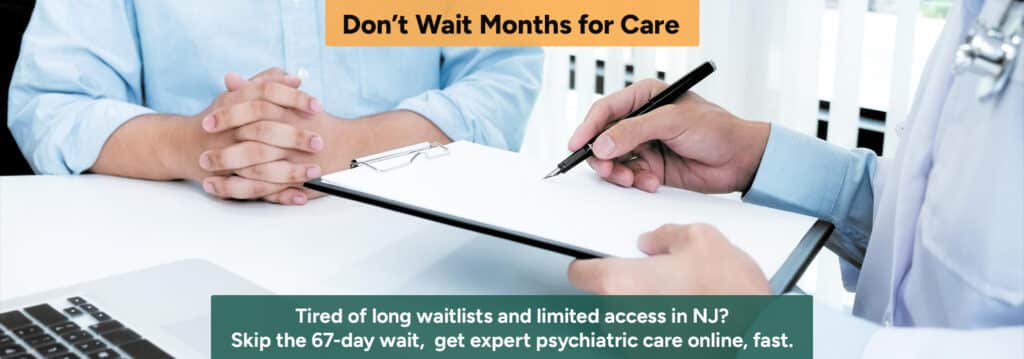
| Barrier | Real-Time Stats |
| Limited local supply | 404,293 NJ residents live in mental-health HPSAs; 52.7% of need met; 28 additional clinicians needed to remove designations. |
| Insurance & cost friction | Unmet need 24% (2016–2018) and 22% (2018–2019) among adults with mental illness; low psychiatrist Medicaid acceptance (42%) adds barriers. |
| Waitlists | Only 18.5% of psychiatrists are accepting new patients; the median wait time is 67 days in-person versus 43 days via telepsychiatry. |
| Time, travel, and childcare | 22.6% reported transportation/childcare/appointment-time problems; 47.0% of adults said they didn’t have enough time for treatment. |
| Stigma & privacy concerns | 14.3% cited confidentiality concerns, 11.9% feared others finding out, 16.7% worried about community judgment, and 14.6% feared job impact. |
| Not sure where to start | People aren’t sure if they need it; 37.8% of untreated young adults with depression said they didn’t know where to go for services. |
Why CPG Is Your Mental Health Care Partner
We remove common barriers to anxiety care in New Jersey:
- 24-hour appointments statewide
- All insurances accepted, including Medicare & Medicaid
- Board-certified psychiatrists
- HIPAA-compliant telepsychiatry for privacy
- Personalized treatment plans with ongoing follow-up
- Integrated care: Medication + CBD therapy + lifestyle strategies
Online Psychiatric Care Explained
- A private, secure video call (30–60 min).
- Discussion of your symptoms, history, and daily challenges.
- Brief screening tools (e.g., GAD-7) for clarity.
- Review of medical history and co-occurring issues (depression, ADHD, etc.).
- A tailored plan with follow-up visits (15–30 min) every 2–4 weeks initially.
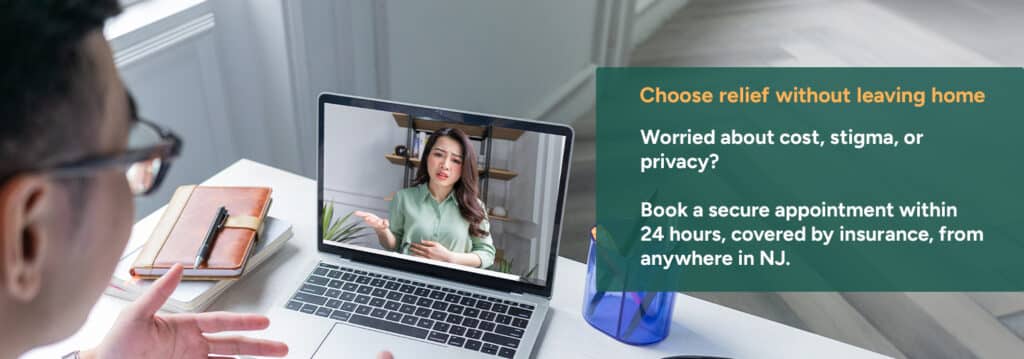
Effective Treatment Options for GAD (Accessible Online)
There is no one-size-fits-all plan. CPG offers evidence-based treatment curated to each patient:
Medication Options
- First-line: SSRIs or SNRIs.
- Timeline: Takes 2–4 weeks for initial effect, 6–8 weeks for full benefit.
- Monitoring: We carefully adjust doses together to maximize benefits, minimize side effects.
Therapy Integration
- Cognitive Behavioral Therapy (CBT): Gold-standard treatment for GAD. Helps change anxious thought patterns, reduce avoidance, and build coping skills.
- Exposure therapy (via telehealth): Structured practice with feared situations, even from your home environment, with your therapist guiding you through real triggers
Lifestyle Supports
- Breathing techniques (like the 5–3–8 method: inhale 5, hold 3, exhale 8) to calm the nervous system.
- Daily physical activity (walking, jogging, yoga) has been proven to reduce anxiety.
- Sleep hygiene and limiting caffeine/alcohol to support treatment.
Don’t Wait to Feel Better
Benefits of Online GAD Care in New Jersey
- 13% increased presence rate for Telemedicine than in-person (25%).
- Median wait was 67 days in-person vs 43 via telepsychiatry.
- Telehealth helps mitigate travel-time disparities, improving reach for patients far from clinics.
- Patients and practices save costs (travel avoided; efficiency gains) with telehealth programs.
- 2.9 hours driving + 1.2 hours in-clinic hours saved per visit on average, sometimes 4–6 hours.
- Studies have shown that ICBT (internet-based CBT) and face-to-face CBT treatment produced equivalent overall results.
- Telepsychiatry uses HIPAA-compliant platforms; privacy and confidentiality are comparable to in-person.
- Telepsychiatry quality matches in-person for diagnostic accuracy, treatment effectiveness, quality, and patient satisfaction.
Why Choose Capital Psychiatry Group (Telepsychiatry for Anxiety in NJ)
- Board-certified providers
- 24-hour appointments
- Same-day telepsychiatry
- All insurances accepted
- HIPAA-compliant audio/video visits
- Statewide (New Jersey) coverage
- Evidence-based screening (GAD-7 / PHQ-9)
- DSM-5–aligned virtual evaluations
- Precision medication management
- Ongoing clinical monitoring & clear follow-ups
Take the First Step Toward Relief
FAQs About Anxiety Disorders in New Jersey
We accept all major plans. Our team can verify your benefits before you book, so you know the likely costs up front.
We offer a telepsychiatry slot within 24 hours statewide.
We aim for continuity, so you’re always booked with the same clinician.
We typically meet every 2–4 weeks to review benefits and side effects. Once you’re stable, visits are usually spaced every 4–12 weeks, personalized to your needs.
Yes, visits run on a HIPAA-compliant platform. Join from a private space on your phone, tablet, or computer; we don’t record clinical visits, and your information is protected like any medical appointment.
Yes. Your clinician takes a full history, reviews symptoms, and may use brief screens (like the GAD-7) to support a clinical diagnosis. Telepsychiatry isn’t for emergencies; if you’re in crisis, call 988 or 911.
How we reviewed this article:
CPG experts follow strict sourcing standards, using peer-reviewed research, academic institutions,
and trusted medical journals. Only reliable, evidence-based sources are cited to maintain accuracy
and integrity.
- https://www.nimh.nih.gov/health/topics/anxiety-disorders
- https://www.nimh.nih.gov/health/statistics/generalized-anxiety-disorder
- https://pubmed.ncbi.nlm.nih.gov/36573969/
- https://www.samhsa.gov/data/sites/default/files/reports/rpt39443/2021NSDU
- https://jamanetwork.com/journals/jamapediatrics/fullarticle/2724377
- https://pubmed.ncbi.nlm.nih.gov/15939837/
- https://www.nimh.nih.gov/health/statistics/suicide
- https://pmc.ncbi.nlm.nih.gov/articles/PMC9925363/
- https://www.valueinhealthjournal.com/article/S1098-3015(24)02251-4/pdf
- https://pubmed.ncbi.nlm.nih.gov/22154706/
- https://data.hrsa.gov/default/generatehpsaquarterlyreport
- https://policylab.rutgers.edu/publication/behavioral-health-reimbursement-and-unmet-mental-health-needs-in-nj/
- https://pubmed.ncbi.nlm.nih.gov/37290263/
- https://www.hhs.gov/hipaa/index.html
- https://pmc.ncbi.nlm.nih.gov/articles/PMC10063994/
- https://www.ajpmonline.org/article/S0749-3797(24)00066-7/abstract
- https://pmc.ncbi.nlm.nih.gov/articles/PMC11629038/
- https://pmc.ncbi.nlm.nih.gov/articles/PMC11694481/
- https://www.cancer.gov/news-events/cancer-currents-blog/2023/telehealth-cancer-care-saves-time-money
- https://pubmed.ncbi.nlm.nih.gov/29215315/
- https://www.psychiatry.org/patients-families/telepsychiatry
Clinical Adviser:
Author:
